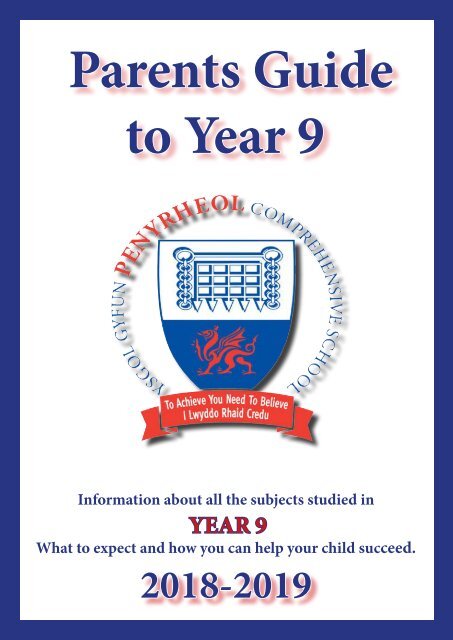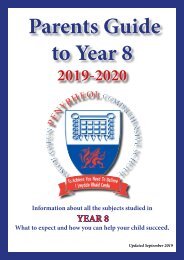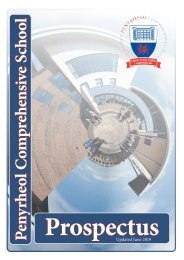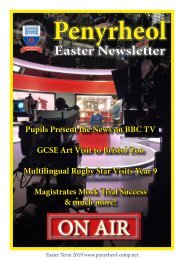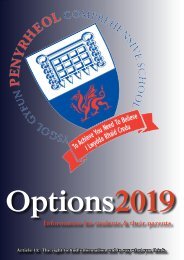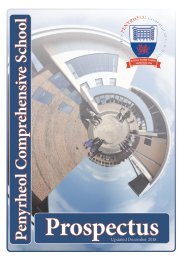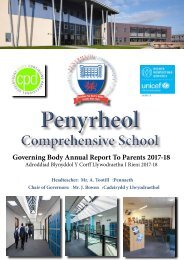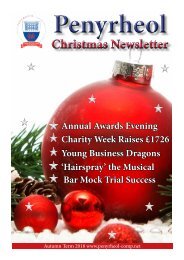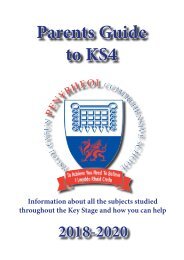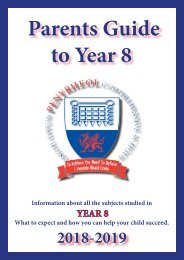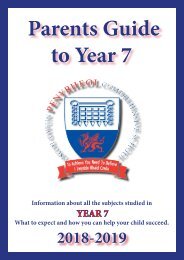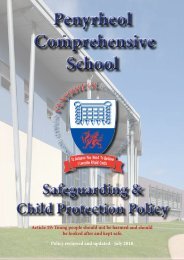Year 9 Parent Guide November 2018
Create successful ePaper yourself
Turn your PDF publications into a flip-book with our unique Google optimized e-Paper software.
<strong>Parent</strong>s <strong>Guide</strong><br />
to <strong>Year</strong> 9<br />
Information about all the subjects studied in<br />
YEAR 9<br />
What to expect and how you can help your child succeed.<br />
<strong>2018</strong>-2019
Key Dates in <strong>Year</strong> 9<br />
SCHOOL TERMS AND HOLIDAYS <strong>2018</strong>/19<br />
Mid Term Holidays<br />
Term Term Begins Terms Ends Begins Ends Term Begins Term Ends<br />
Autumn<br />
<strong>2018</strong><br />
Spring<br />
2019<br />
Summer<br />
2019<br />
Monday<br />
3rd<br />
September<br />
Monday<br />
7th<br />
January<br />
Monday<br />
29th<br />
April<br />
Friday<br />
26th<br />
October<br />
Friday<br />
22nd<br />
February<br />
Friday<br />
24th<br />
May<br />
Monday<br />
29th<br />
October<br />
Monday<br />
25th<br />
February<br />
Monday<br />
27th<br />
May<br />
Friday<br />
2nd<br />
<strong>November</strong><br />
Friday<br />
1st<br />
March<br />
Friday<br />
31st<br />
May<br />
Monday<br />
5th<br />
<strong>November</strong><br />
Monday<br />
4th<br />
February<br />
Monday<br />
3rd<br />
June<br />
Friday<br />
21st<br />
December<br />
Friday<br />
12th<br />
April<br />
Friday<br />
22nd<br />
July<br />
IMPORTANT DATES:<br />
Interim Report Issued - 22nd <strong>November</strong> <strong>2018</strong><br />
<strong>Year</strong> 9 Options Programme Starts 28th January 2019<br />
Options Fair - 6th February 2019<br />
<strong>Year</strong> 9 Examinations - 13th-19th February 2019<br />
End of <strong>Year</strong> Report Issued - 22nd March 2019<br />
<strong>Year</strong> 9 <strong>Parent</strong>s’ Evening - 25th March 2019<br />
Final Options Deadline - 5th April 2019<br />
CONTACT INFORMATION:<br />
Telephone: 01792 533066<br />
Head of <strong>Year</strong>: Mrs. C. Hyndman<br />
Pastoral Support Officer: Miss. C. Francis<br />
School Website: www.penyrheol-comp.net<br />
Twitter: @Penyrheol
Presentation of Work<br />
1. Work must be presented neatly at all times.<br />
2. Always write in blue or black pen.<br />
3. Drawings or diagrams must be done in pencil but labelled in pen.<br />
4. Always write in your neatest handwriting.<br />
5. Lay out your work like this:<br />
Classwork/Homework<br />
Date<br />
Title of Work<br />
6. Put numbers or letters of questions in the margin.<br />
7. Write on the top line of every page and start near the margin.<br />
8. Write on every page. Don’t leave big gaps.<br />
9. No Tipp-Ex. Cross out with one straight line. Don’t use brackets<br />
instead of crossing out.<br />
10. No graffiti.<br />
It is your responsibility to copy up work missed due to absence and<br />
ensure your work is complete.
English<br />
What will your child study in <strong>Year</strong> 9?<br />
Head of Department: Miss. K. Jones<br />
Each half term, pupils will focus on a different theme in which they will encounter a variety of fictional and<br />
non-fictional texts.<br />
Reading<br />
Some texts will require very little reading but others will need more in-depth reading and will be<br />
more challenging. The texts will require different approaches and responses.<br />
Writing<br />
Some of the writing tasks will require a brief response whilst others will focus on extended writing. Pupils<br />
will write a variety of different text types, for example, descriptive, narrative, in-structional, informative<br />
and persuasive texts. Pupils will work on effective organisation of ideas in their writing but they will also be<br />
expected to write with grammatical accuracy and correct spelling: 50% of the marks will be given for spelling<br />
and grammar.<br />
Speaking and Listening<br />
Pupils will be involved in pair / group discussions.<br />
How will your child be assessed?<br />
Term Theme Key Task<br />
Autumn Term<br />
(1st half term)<br />
Autumn Term<br />
(2nd half term)<br />
Spring Term<br />
(1st half term)<br />
Spring Term<br />
(2nd half term)<br />
Summer Term<br />
Prom<br />
Novel<br />
News Desk<br />
Shakespeare<br />
Travel and Adventure<br />
Writing: Creating an argument - A formal letter to<br />
Mr Tootill and a short report to consider alternatives to the<br />
school prom.<br />
Reading: Close reading of the text, analysing the writer’s<br />
intentions.<br />
Writing: A short narrative response.<br />
Speaking and Listening: : Individual presentation based on<br />
the themes of the novel.<br />
Reading: Close reading of non-fiction text.<br />
Writing: Writing an article for a specific audience and<br />
purpose.<br />
Reading: Close reading of the presentation of a character.<br />
Speaking and Listening: Assessed group discussion.<br />
Writing: A brochure to persuade readers to visit a chosen<br />
area - A descriptive opening.
English Continued<br />
How can you support your child?<br />
◆◆•<br />
◆◆•<br />
◆◆•<br />
◆◆•<br />
◆◆•<br />
◆◆•<br />
◆◆•<br />
◆◆•<br />
Making sure that all homework (written in diaries) is completed<br />
Reading with your child several times a week and talking about what you have read<br />
Having plenty of reading material at home such as books, newspapers and magazines<br />
Going through the spelling of words and testing your child on difficult words<br />
Having a dictionary and thesaurus available for use at home<br />
Discussing work that is being done and offering ideas and suggestions<br />
Checking through written work and helping your child with punctuation, spelling and gram-mar<br />
Helping your child use the internet for research purposes.<br />
English trips and/or extra curricular activities in <strong>Year</strong> 9<br />
These change each year but might include: author visits, writing workshops, theatre visits and occasional<br />
trips when relevant. Past trips have included a visit to the Harry Potter Studios.<br />
Twitter: @penyrheolEng
Maths<br />
Head of Department: Mr. G. Roberts<br />
What will your child study in <strong>Year</strong> 9?<br />
<strong>Year</strong> 9 Maths builds on the work done in previous years. As your child starts <strong>Year</strong> 9 it is important to realise<br />
that they will be expected to remember and use work and skills studied in <strong>Year</strong>s 7 and 8. This may require<br />
some revision if your child has not retained the work.<br />
It is VERY important that the books from <strong>Year</strong>s 7 and 8 are kept safe as they will be needed to revise from<br />
during the year, at the end of the year and also in the years to come. Everything done in maths can be in the<br />
GCSE exam in <strong>Year</strong> 11 and pupils will need to look back on all of the work to prepare for those exams.<br />
Due to the fact that there are now two GCSE exams in Maths, we are planning to cover all the work for the<br />
numeracy GCSE during <strong>Year</strong> 9 and <strong>Year</strong> 10. This means that pupils will sit the GCSE Numeracy exam in the<br />
Summer Term of <strong>Year</strong> 10 and then start preparing immediately to sit the Maths GCSE in the Summer Term<br />
of <strong>Year</strong> 11. All the content of the Numeracy exam is included in the Maths exam also which is why the<br />
Numeracy exam will be sat prior to the Maths exam. Each qualification is assessed with two exams, one<br />
calculator and one non-calculator. They are separate qualifications so do not have to be sat at the same tier of<br />
entry.<br />
Both GCSE Numeracy and GCSE Mathematics are offered at three tiers of entry.<br />
Higher Tier<br />
Grades A* to C are available. This course is designed for pupils aiming for A and A* grades.<br />
Intermediate Tier<br />
Grades B to E are available. This course will be suitable for most pupils.<br />
Foundation Tier<br />
Grades D to G are available. There is an obvious disadvantage to this course as a grade C isn’t available.<br />
However, it may be that your child hasn’t developed enough mathematically yet to sit the Intermediate Tier<br />
and may run the risk of not getting a grade at all if they are entered for it.<br />
It is vital that your son/daughter works hard in <strong>Year</strong> 9 so we can assess their ability and make<br />
the correct judgement about their Maths set for <strong>Year</strong> 10.<br />
Classwork will not be marked by the teacher as it will be marked in lessons as part of self and peer<br />
assessment. If your child is away when a piece of work is marked then make sure that they borrow a book or<br />
booklet to mark it, asking the teacher if there is a problem. Your child’s book can be asked for at any time to<br />
check that it is up to date and organised and marking will be monitored in this way.<br />
If your child’s teacher wants to mark a specific piece of classwork for assessment, this work will be in the<br />
back of your child’s book, along with any homework.<br />
How will your child be assessed?<br />
Assessment will be in the form of module tests done throughout the year, one per half term. These will be<br />
marked by the teacher. Pupils will complete a self-assessment following the test to identify areas of weakness.
Maths Continued<br />
These tests will be stored in school as evidence of Teacher Assessed Levels.<br />
February/March - pupils will sit an exam with all the work covered before Christmas in it. Pupils will need<br />
to revise for a considerable length of time for this test even if they have done well in all topic tests as they may<br />
forget work. A revision homework will be set in January to help pupils to prepare.<br />
May - The Numeracy procedural and reasoning tests will be sat in May. The results of these tests should be<br />
ba in school by July and will form part of our assessment of the best tier of entry for the Numeracy GCSE in<br />
<strong>Year</strong> 10.<br />
Mid June - pupils will sit their end of year exam with ALL the work covered during the year in it.<br />
A revision list of topics will be provided to ensure thorough revision. This exam will be in two parts: a<br />
calculator paper and a non-calculator paper. This exam is extremely important to reviewing the set your child<br />
is in going into <strong>Year</strong> 10 which could affect their tier of entry for the Numeracy exam at the end of year. This<br />
exam is done in maths classes so is not on the school calendar as dates cannot be set so far in advance.<br />
Although homework marks are recorded, we cannot use these as an assessment of your child’s level as they<br />
are not done under teacher supervision. However, pupils with good homework marks generally perform<br />
better in exams due to the fact they will have revised work in completing homework to a good standard.<br />
How can you support your child?<br />
◆◆•<br />
◆◆•<br />
◆◆•<br />
◆◆•<br />
Help your child learn their tables if they are not confident. This can be done by writing them out, chanting<br />
them and then testing them out of sequence. If your child can only answer a question like 6 x 8 by<br />
counting up 8, 16, 24, 32, 40, 48 then they are not fluent enough to be fully confident.<br />
If your child is away from school, ensure that work is copied up straight away by borrowing another pupil’s<br />
book or booklet. After the work is copied up your child can ask the teacher for help if it is needed.<br />
Encourage your child to “have a go” and show methods without fear of being wrong. Fear of failure is a<br />
big barrier to learning in Maths.<br />
Ensure they have the correct equipment including a Scientific Calculator (preferably a Casio).<br />
With Homework: If your child is finding a homework task difficult, you can help in the following ways:<br />
◆◆•<br />
◆◆•<br />
◆◆•<br />
◆◆•<br />
Encourage them to look in their books and online for any examples or information they may have forgotten.<br />
If it is a My Maths task, make sure they are using the lesson button at the corner of the homework<br />
task.<br />
Encourage them to do the question first and then ask you to check it, rather than you telling them what to<br />
do. You will then be able to see where they have gone wrong to home in on where they are getting stuck.<br />
Make sure they understand that homework is an opportunity to research and revise so all questions<br />
should be attempted. If they get them wrong then the teacher will go over any misconceptions in class<br />
with them.<br />
Encourage them to try the homework as they get it! Far too many pupils leave it until the night before or<br />
even the morning it is due in.<br />
It is very tempting as a parent to sit and help too much which ultimately doesn’t develop the skills<br />
your child needs to cope with the new Maths curriculum. However, by following these guidelines<br />
you are reinforcing the principles we follow in school which will be very beneficial to your child.<br />
Twitter: @penyrheolMaths
Science<br />
Head of Department: Mrs. S. Goulden<br />
What will your child study in <strong>Year</strong> 9?<br />
We aim for all pupils to enjoy their scientific experiences and achieve an excellent understanding of our<br />
subject. We are passionate about science and aim for all pupils to achieve their potential by the end of Key<br />
Stage 3. In <strong>Year</strong> 9, your son/daughter will be studying:<br />
Chemistry Physics Biology<br />
Chemical Patterns<br />
Displacement Reactions<br />
Elements and Compounds<br />
The Period Table<br />
Balanced Forces<br />
Moving Energy<br />
Work Done<br />
Insulators<br />
Being Healthy<br />
Inheritance<br />
Respiratory System<br />
Drugs<br />
All of our laboratories are equipped with interactive whiteboards and an excellent range of resources to<br />
also promote essential literacy, numeracy and ICT skills.<br />
Your son/daughter will improve their thinking skills by:<br />
◆◆•<br />
◆◆•<br />
Conducting a series of enquiries within the above topics that will develop your son/daughter’s planning,<br />
analysing and reflection skills.<br />
Developing their thinking tools and learning strategies as part of teaching and learning.<br />
How will your child be assessed?<br />
All <strong>Year</strong> 9 pupils are taught in set classes. Pupils progress in is monitored closely. Pupils are set again at the<br />
end of <strong>Year</strong> 9 using enquiry levels (and the <strong>Year</strong> 9 summer examination result).<br />
How can you support your child?<br />
◆◆•<br />
◆◆•<br />
Look through your son/daughter’s exercise book with him/her. Encourage your child to com-plete any<br />
unfinished work, improve the presentation of their work, and to discuss the con-cepts he/she has studied.<br />
This will help with test revision.<br />
Emphasise the importance of completing quality homework on time. Feel free to help your son/daughter,<br />
or contact our department if he/she is experiencing difficulty.<br />
Please ensure that your son/daughter copies up work missed if he/she is absent from school.<br />
◆◆•<br />
◆◆•<br />
Help your child to develop study skills when revising for tests and examinations. Buying a Key Stage 3<br />
revision guide can help – these can often contain glossy diagrams and questions to help your son/daughter<br />
to test their understanding.<br />
◆◆•<br />
Encourage your son/daughter to understand the world of science beyond school. There are many books<br />
and internet sites available to fuel your child’s imagination. Visits to Techniquest and local museums also<br />
help to develop an inquisitive nature.<br />
Twitter: @penyrheolSci
Art<br />
What will your child study in <strong>Year</strong> 9?<br />
Head of Department: Mrs. V. Hine<br />
All pupils in <strong>Year</strong> 9 have the opportunity to study Art for 3 hour lessons in the two week timetable.<br />
Pupils in <strong>Year</strong> 9 continue to develop their artistic skills by experimenting with a range of media, techniques<br />
& processes. Pupils will focus on symmetry within their drawings and applying detail and tone to their work.<br />
Pupils learn to Express and communicate ideas and feelings where their performance is continually assessed.<br />
Pupils are involved in evaluating their own and each other’s performance, and in setting targets for their own<br />
development.<br />
Autumn Term – Spring Term (Sep - Feb) Sweets<br />
Within this unit students are given the opportunity to explore various materials and techniques related to the theme<br />
sweets. Students will draw from direct observation focusing on 3 dimensional shapes looking at cylinders and cubes.<br />
Students will apply detail to their work and will develop painting skills focusing on blending and application of paint.<br />
The contemporary artist Sarah Graham will inspire students. Sketchbooks will be used to develop ideas where they<br />
will draw various logos of famous brands and learn how to draw various shapes of different sweets. The final outcome<br />
is to produce a detailed painting of sweets focusing on form, tone and pattern. All students will become involved in<br />
assessment for learning during the project where they will record peer and self-assessment in sketchbooks which they<br />
can reflect on during learning.<br />
Spring Term – Summer Term (Feb - Jul)<br />
Natural Forms<br />
Within this unit, students are given the opportunity to develop specific skills for recording from observation focusing<br />
on producing various leaf drawings and bug drawings. Students will investigate the formal elements of Art and<br />
experiment with a range of different materials. Students will record their observations and develop ideas by learning<br />
about the elements of Art through line, tone, colour and symmetry based on natural forms. They will develop ideas<br />
and intentions by working from first-hand observations, experience, inspiration and imagination. The outcome for<br />
this project is to produce a ceramic beetle and leaves ceramic tile. All students will record their levels and have a target<br />
of what is required in order to improve. All students will also comment on their progress where information will<br />
be stored in sketchbooks where students can reflect on their learning.<br />
All pupils will need to have basic art equipment for their lessons: Various shading pencils HB, 2B, 4B, eraser,<br />
sharpener, glue, coloured pencils, black sharpie & alphabet stickers or transfers.<br />
How will your child be assessed?<br />
Within each project introduced the pupils will apply numeracy within their work to develop artistic<br />
abilities and mathematical skills. They will also complete literacy tasks and evaluate their learning to improve<br />
literacy skills. All pupils record their learning regularly and set targets in order to continue to develop and<br />
meet their end of year target level. Students will also be involved in peer assessment, group assessment and<br />
self-assessment during lessons.<br />
How can you support your child?<br />
◆◆• Visit art galleries & museums to increase their knowledge of Art.<br />
◆◆• Watch Art documentaries to increase knowledge of artists.<br />
◆◆• Ensure your child is spending quality time on their homework & provide essential art equipment<br />
◆◆• Encourage internet research of various artists and cultures.<br />
Twitter: @penyrheolArt
Design & Technology<br />
What will your child study in <strong>Year</strong> 9?<br />
Head of Department: Mr. M. Rees<br />
At Key Stage 3, pupils should be given the opportunities to build on the knowledge, understanding and<br />
skills acquired at Key Stage 2. They should be taught to design and make products by combining their designing<br />
and making skills with knowledge and understanding in contexts that allow them to make decisions<br />
based on the values that underpin society, helping them to become active and informed citizens.<br />
The pupils should be made aware of human achievements and the big ideas that have shaped the world.<br />
They should be encouraged to be enterprising and innovative in their designing and making while having<br />
regard for sustainability and environmental issues in the 21st century.<br />
Pupils will experience the broad nature of Design and Technology. Pupils will deal with several factors in<br />
their experiences; Health and Safety, CADCAM (computer aided design, computer aided manufacture) Resistant<br />
Materials, Compliant Materials and Food. Pupils will follow rotational courses and visit each teacher<br />
who delivers their specialism within the subject. All pupils will follow the same format in each aspect of the<br />
subject, to aid the learning experience. It is vital pupils are equipped with the basic equipment during lessons<br />
and any homework set is com-pleted on time.<br />
How will your child be assessed?<br />
Each course is individually assessed by the specialist teacher. All pupils will sit an end of year exam which<br />
covers general Design and Technology elements.<br />
How can you support your child?<br />
◆◆•<br />
◆◆•<br />
◆◆•<br />
Showing an interest in the work they are doing in Design and Technology – the subject has changed<br />
massively since you were in school!<br />
Speaking about items in the news of a technological nature – this helps to develop an interest.<br />
Help with homework and stress the importance of producing the best work of your child’s ability.<br />
Twitter: @penyrheolDT
Drama<br />
Head of Department: Mrs. A. Williams-Sheaf<br />
What will your child study in <strong>Year</strong> 9?<br />
In Key Stage Three Drama focuses on developing skills that will allow each pupil to gain confidence in their<br />
abilities as an individual, work effectively as a team and gain a deeper understanding of the world using<br />
performance skills, dramatic forms and theatre skills and techniques.<br />
Pupils will be involved in schemes of work that will explore and develop the following skills:<br />
Making<br />
Pupils will be observed and assessed in lessons on the contribution of ideas that demonstrate understanding<br />
of skills and techniques which lead to finished presentations and the ability to work well with others.<br />
Performing<br />
In assessed tasks, marks are awarded for ability to perform characters using voice, movement and facial<br />
expressions. Marks are also awarded for using dramatic techniques and theatre styles, good use of space<br />
and for effective communication with other actors and with the audience.<br />
Evaluating<br />
This takes place when work is presented in lessons. This involves the ability to reflect and comment on own<br />
and others’ work. This may be done verbally or in writing. Performances are evaluated by pupils by<br />
commenting on what was effective and why, and what could be improved and how.<br />
How will your child be assessed?<br />
Work is marked in levels for each area of assessment e.g.:<br />
Making Level 4- Performing Level 4+ Evaluating Level 3+<br />
An overall level is then awarded at the end of each assessment which would consider all three areas.<br />
For the above it would be Level 4. Formal assessment takes place every term and targets are given for areas of<br />
improvement.<br />
How can you support your child?<br />
<strong>Parent</strong>s/guardians can assist the development of their child’s work by discussing the content of each lesson<br />
and debating topical issues and current affairs in order to build confidence, improve communication skills<br />
and form opinions.<br />
Drama trips and/or extra curricular activities in <strong>Year</strong> 9<br />
We attempt to take theatre trips whenever possible and/or host visiting theatre groups. Pupils may also<br />
have the opportunity to participate in our annual School Production which is staged in the week prior to the<br />
October Half Term break.<br />
Twitter: @penyrheolDrama
French<br />
What will your child study in <strong>Year</strong> 9?<br />
Head of Department: Mrs. C. Young<br />
The <strong>Year</strong> 9 course involves oracy (speaking & listening), reading and writing through purposeful and<br />
entertaining activities which build up language learning gradually. Topics studied include:<br />
En Voyage<br />
Ca Va?<br />
1. Talk about travel plans<br />
2. Understand signs at a station<br />
3. Buy a train ticket<br />
4. Say what must or should not be done<br />
5. Understand travel information<br />
6. Travel by air, coach and boat<br />
7. Describe a recent day out<br />
En Famille<br />
1. Introduce people<br />
2. Ask and answer questions when staying with a<br />
French family<br />
3. Talk about what you have done recently<br />
4. Talk about presents and souvenirs<br />
5. Say goodbye and thank you<br />
1. Discuss clothes and what to wear<br />
2. Describe people’s appearance<br />
3. Talk about parts of the body<br />
4. Say how you feel and describe what hurts<br />
Au College<br />
Pupils in the Intermediate Sets follow the Salut! Course and topics studied include:<br />
1. Describe your school<br />
2. Talk about the school day<br />
3. Describe how you travel to school<br />
4. Talk about morning and evening routines<br />
5. Give opinions about school subjects and<br />
aspects of school life<br />
6. Say what you want and don’t want to do<br />
◆◆•<br />
◆◆•<br />
Talk about yourself and family, Talk about hobbies, Discuss daily routine, Make social arrangements, Talk<br />
about parts of the face and the body, Say what’s wrong with you, Say what you eat<br />
Learn about shops and buy food.<br />
How will your child be assessed?<br />
<strong>Year</strong> 9, are regularly assessed in class through all four skills; reading, writing, speaking and listening. They<br />
will also have learning home works.<br />
How can you support your child?<br />
◆◆•<br />
◆◆•<br />
◆◆•<br />
◆◆•<br />
Testing vocabulary and numbers.<br />
Assisting your child in using the dictionary.<br />
Making your child aware of French products in the supermarket.<br />
Using www.languagesonline.org.uk<br />
French trips and/or extra curricular activities in <strong>Year</strong> 9<br />
There is a lunchtime language club which pupils are encouraged to attend.<br />
Twitter: @penyrheolMFL
Geography<br />
Head of Department: Mr. M. Hyndman<br />
What will your child study in <strong>Year</strong> 9?<br />
Atlas skills, day-night and seasons<br />
Around the World<br />
Sustainability<br />
Development<br />
Natural Regions – deserts, rainforests, artic and savannah<br />
How will your child be assessed?<br />
Pupils are assessed using a variety of strategies including:<br />
◆◆•<br />
◆◆•<br />
◆◆•<br />
Extended writing tasks<br />
Location map tests<br />
Numeracy and literacy exercises to provide a best fit level.<br />
How can you support your child?<br />
◆◆•<br />
◆◆•<br />
◆◆•<br />
◆◆•<br />
Encourage your child to be more sustainable. Walk rather than drive or use public transport. Recycle<br />
glass, paper, aluminium cans and other household items. Start a compost heap or join an environmental<br />
organisation.<br />
Watch geography programmes on the Discovery Channel or mainstream television espe-cially those on<br />
deserts, rainforests, artic or savannah.<br />
Use an atlas to find the exact location of holidays and how you got there.<br />
When travelling by car use an atlas and ask them to follow your route.<br />
Geography trips and/or extra curricular activities in <strong>Year</strong> 9<br />
Pupils in the past have enjoyed visits to subject related places such as Big Pit, Blaenafon/Cardiff Bay, Dartmoor<br />
National Park and the Eden Project. These change annually. In March, pupils will enjoy a fascinating<br />
presentation by local environmentalist Phil Williams.<br />
Twitter: @penyrheolGeog
History<br />
What will your child study in <strong>Year</strong> 9?<br />
Head of Department: Dr. C. J.Rees<br />
WALES AND BRITAIN IN THE INDUSTRIAL AGE c. 1750-1918<br />
The Agricultural Revolution<br />
Working conditions in factories and mines<br />
The causes and consequences of the<br />
Industrial Revolution<br />
Developments in the field of transport<br />
Popular preotest and the fight for<br />
The British Empire<br />
parliamentary reform<br />
The causes of the first world war The civil rights movement in America in the 1950’s<br />
and 1960’s<br />
The First World War: recruitment, trench warfare, The Battle of the Somme, The Home Front, The end of<br />
the war.<br />
As a result of studying History, pupils will develop the ability to:<br />
◆◆•<br />
Explain the causes and consequences of events<br />
◆◆•<br />
Examine and evaluate evidence<br />
◆◆•<br />
Be aware of different points of view in History<br />
◆◆•<br />
Research and investigate topics<br />
◆◆•<br />
Communicate in ideas in a variety of ways<br />
How will your child be assessed?<br />
Your child will undertake 4ASSESSMENT TASKS, designed to test and improve their historical skills: -<br />
1. October – The Agricultural Revolution 1700-1900<br />
2. December – How Britain changed from 1700-1900<br />
3. February – Interpretation work on the Peterloo Massacre 1819<br />
4. April – A research project on Life in the Trenches<br />
How can you support your child?<br />
◆◆•<br />
◆◆•<br />
◆◆•<br />
◆◆•<br />
◆◆•<br />
Check through your child’s written work and help with spelling, punctuation and grammar<br />
Stress the need to write full detailed answers.<br />
Provide plenty of reading materials such as ‘All Quiet on the Western Front’.<br />
Encourage your child to use the internet for research purposes.<br />
Encourage your child to develop an inquisitive nature and a desire to seek answers.<br />
History trips and/or extra curricular activities in <strong>Year</strong> 9<br />
The History Department has run several trips to the First World War Battlefields, incorporating visits to<br />
Ypres in Belgium and the Somme region as part of the <strong>Year</strong> 9 studies.<br />
Twitter: @penyrheolHanes
I.C.T<br />
What will your child study in <strong>Year</strong> 9?<br />
Head of Department: Mr. R. Marks<br />
The focus for <strong>Year</strong> 9 pupils is preparation for the GCSE ICT and Computing specifications in <strong>Year</strong> 10.<br />
Pupils will take time to familiarise themselves with higher level skills and utilise these when producing a large<br />
scale business project. They will also start to work more electronically with less paper handouts and more<br />
computer based templates.<br />
TASK 1: Pupils are asked to create and interrogate a Travel Agents holiday database from a basic text data<br />
file. They will learn field naming conventions, data types and complex queries.<br />
TASK 2: Pupils will spend time reviewing a range of business documents and create their own ‘House Style’<br />
for their Travel Agents. They will achieve this by initially creating a logo and business card.<br />
TASK 3: Pupils will create an animated web banner utilising their travel agent logo. This will be converted<br />
into a GIF.<br />
TASK 4: Pupils will then create a mood board to assist with their website design. The mood board will<br />
feature image and text research and hexadecimal colour references to be used on their website<br />
TASK 5: Pupils will create a PhotoStory video using their research, to promote the travel agency. They will<br />
record voice-overs, layer background music and learn some basic video editing skills in preparation for<br />
using this video on their website.<br />
TASK 6: Finally, pupils will bring together the multimedia skills they have learned throughout the topic to<br />
create a website for their travel agency. This will make use of professional web-editing software. Whilst<br />
doing this, they will learn some basic HTML coding, how to use hexadecimal colours and make a website<br />
accessible to all users.<br />
Important skills in this year’s scheme of work are to learn new multimedia techniques, to respond<br />
effectively to peer assessment and to gain an understanding of the basic concepts of a programming<br />
language. These skills will give pupils an experience of integral parts of the GCSE ICT and Computing<br />
specifications.<br />
How will your child be assessed?<br />
Pupils’ overall ICT levels are derived from classroom and homework tasks that they complete throughout<br />
the year. Pupils will also sit an end of year test that contributes to the feedback they receive on their final <strong>Year</strong><br />
9 report.<br />
How can you support your child?<br />
<strong>Parent</strong>s can help by making sure pupils read the instructions on each homework sheet carefully before<br />
completing them. Assistance for parents can be found online at https://www.thinkuknow.co.uk/parents/<br />
ICT trips and/or extra curricular activities in <strong>Year</strong> 7<br />
There is an ICT Club each Wednesday at lunch time where pupils get the opportunity to practise<br />
programming, games design and lego robotics.<br />
Twitter: @penyrheolICT
Music<br />
What will your child study in <strong>Year</strong> 9?<br />
Head of Department: Mrs. L. Phipps<br />
◆◆•<br />
◆◆•<br />
◆◆•<br />
◆◆•<br />
Learning to perform vocally and on a variety of instruments including keyboard, ukulele, guitar and<br />
percussion instruments.<br />
Learning to compose for a variety of instruments including the voice.<br />
Learning to listen critically to a wide range of music from various styles, eras and backgrounds. This<br />
includes classical, rock, pop, blues and various world music<br />
Learning to develop ICT skills using iPad software packages<br />
Topics covered in <strong>Year</strong> 9 include:<br />
Film Music Theme and Variations Christmas Music<br />
Textures in Pop Music<br />
Britpop<br />
Cerddoriaeth o Gymru<br />
/ Music of Wales<br />
How will your child be assessed?<br />
There is a class assessment at the end of each half term where the pupils will perform the piece they have<br />
been working on.<br />
How can you support your child?<br />
◆◆•<br />
◆◆•<br />
◆ ◆•<br />
◆◆•<br />
◆◆•<br />
◆◆•<br />
◆◆•<br />
◆◆•<br />
Encouraging them to learn an instrument through the in-school peripatetic service (Strings, Woodwind<br />
and Brass)<br />
Encouraging them to participate in one of the many extracurricular ensembles<br />
(Junior Choir, Woodwind Group, String Group, Orchestra, School Production)<br />
Enabling them to practice on a musical instrument at home<br />
Listening to your child singing and make helpful comments<br />
Attending concerts that your child is performing in<br />
Encouraging them to listen to a broad range of music<br />
Taking them to performances of live music (musicals, rock concerts, classical concerts, festivals etc.)<br />
Music trips and/or extra curricular activities in <strong>Year</strong> 9<br />
The department organises a wide selection of extra curricular activiites including girls and boys choirs and<br />
music clubs for keyboard, guitar, strings and woodwind. Pupils get the chance to perform at both the<br />
Summer and Christmas concerts and some have the opportunity to participate in the annual school<br />
production.<br />
Twitter: @penyrheolMusic
Physical Education<br />
Head of Department: Mr. A. Clapperton<br />
Teacher in Charge of Girls: Ms. N. Evans<br />
What will your child study in <strong>Year</strong> 9?<br />
Pupils are taught a range of activities in each of the National Curriculum areas:<br />
Competitive Activities Outdoor & Adventurous Health & Wellbeing Creative Activities<br />
Participation<br />
Encourage your child to participate in every lesson with the correct kit. Send a letter in an enve-lope if they<br />
are too ill to participate. Usually if they are fit enough to be in school they can take part in P.E. Lessons.<br />
Effort<br />
Whatever your child’s ability it is important that they participate with the maximum effort in all lessons. It<br />
doesn’t matter if you can’t do a forward roll as long as you try.<br />
Safety<br />
Accidents in PE can be avoided by the following rules:-<br />
◆◆•<br />
All trainers must be tied up properly<br />
◆◆•<br />
No jewellery to be worn. Please provide tape for earrings which cannot be removed.<br />
◆◆•<br />
All instructions given by PE teachers are concerned with safety.<br />
◆◆•<br />
Encourage your child to listen and carry out the appropriate instructions.<br />
How will your child be assessed?<br />
Pupils are awarded a National Curriculum level based on their performance and knowledge across all the<br />
areas.<br />
How can you support your child?<br />
Ensure your child has the correct P.E. Uniform/Kit (Available from Picton Sports and Sew & Sew):<br />
Girls: P. E. T-shirt (Blue and white with badge), shorts/skorts, sports socks. rugby shirt<br />
(optional), swimming kit, trainers (not school shoes) .<br />
Boys Football boots, Towel (if outside lesson), P. E. T-shirt, shorts/skorts, sports socks. rugby shirt (optional),<br />
swimming kit, trainers and football boots.<br />
P.E. trips and/or extra curricular activities in <strong>Year</strong> 9<br />
Full programme of 5x60 activities, available during and after school.<br />
Full range of sports teams and training opportunities. Competitive matches and inter-school tournaments.<br />
Our own on-site Rugby Development Officer who arranges regular training and fixtures.<br />
Sports Tours are also organised.<br />
***Squad members of ANY team, are expected to be reliable and committed***<br />
Twitter: @penyrheolPE
Religious Education<br />
What will your child study in <strong>Year</strong> 9?<br />
Head of Department: Mrs. L. Picton<br />
Through the course pupils will be engaging with fundamental questions, exploring religious beliefs, teachings<br />
and practices and expressing personal responses. <strong>Year</strong> 9 Pupils will go on to study:<br />
Human Experience<br />
Human Identity<br />
Search for Meaning:<br />
Relationships and responsibility – Persecution and Prejudice, Holocaust – Anne<br />
Frank, Martin Luther King and Racism,<br />
Belonging – Celebration,<br />
Meaning and purpose of life – Good/Evil, Questions about God and Suffering.<br />
The journey of life – pilgrimage e.g. Yad Vashem, Lourdes.<br />
The nature of God/ the Soul, Good and evil<br />
Knowledge and experience of the non-material/spiritual<br />
How will your child be assessed?<br />
Pupils will be given opportunities to develop their skills and their knowledge of Christianity and other<br />
principal religions. Through the course pupils will be engaging with fundamental questions, exploring<br />
religious beliefs, teachings and practices, expressing personal responses.<br />
Specific level assessments throughout the year may include: The Holocaust – Where was God?<br />
Martin Luther King – Civil Rights, Human Identity, Suffering moral/natural.<br />
How can you support your child?<br />
◆◆•<br />
Encouraging your child to use the library for reading material and for research.<br />
◆◆•<br />
Helping your child to use the internet for research and revision purposes.<br />
◆◆•<br />
Encouraging your child to write full detailed responses, particularly with evaluation answers and level<br />
assessments.<br />
◆◆•<br />
Testing your child on the spelling, punctuation, grammar and meaning of key words words e.g. Anti-Semitism,<br />
Holocaust, Civil Rights, Discrimination.<br />
◆◆•<br />
Ensuring that set homework is completed on time and revision is carried out for set tests/examinations<br />
◆◆•<br />
Ensuring there are no pieces of unfinished work in your child’s book.<br />
◆◆•<br />
Helping your child to read any written material they find difficult<br />
◆◆•<br />
Encouraging your child to undertake novel reading on certain topics to enhance literacy skills for<br />
example Anne Frank, Martin Luther King.<br />
◆◆•<br />
Discussing work that is being done and offering ideas and suggestions e.g. ‘Never Again’ – Holocaust Day<br />
27th January in Britain, a warning in History; Civil Rights.<br />
◆◆•<br />
Encouraging discussion of other beliefs and a tolerance of a different world religion.<br />
◆◆•<br />
Being supportive, encouraging self-belief and helping them to seize the opportunity to secure future<br />
success.<br />
R.E. trips and/or extra curriculur activities in <strong>Year</strong> 9<br />
Pupils visit the Imperial War Museum. This visit includes the Holocaust exhibition and they even meet<br />
survivors, as part of their study on Persecution and Prejudice, linking into their level assessments.<br />
Twitter: @penyrheolRE
Spanish<br />
What will your child study in <strong>Year</strong> 9?<br />
Head of Department: Mrs. C. Young<br />
<strong>Year</strong> 9 Spanish will be taught using the MIRA course book. These are fun, engaging and inspiring language<br />
lessons.<br />
Topics of study include:<br />
Hola<br />
1. Introducing yourself<br />
2. Numbers<br />
3. Understanding the concept of masculine<br />
and feminine<br />
Mi Familia<br />
1. Brothers & sisters<br />
2. Higher numbers<br />
3. Family<br />
4. Animals<br />
5. Appearance and character.<br />
En el Instituto<br />
1. School subjects and teachers<br />
2. Likes and dislikes<br />
3. Food<br />
En Casa<br />
1. Describing your house and where you live.<br />
How will your child be assessed?<br />
Pupils will be assessed on their oracy, reading and writing skills throughout the year.<br />
How can you support your child?<br />
◆◆•<br />
◆◆•<br />
◆◆•<br />
◆◆•<br />
Testing vocabulary and numbers.<br />
Assisting your child in using the dictionary.<br />
Making your child aware of Spanish products in the supermarket.<br />
Using www.languagesonline.org.uk<br />
Twitter: @penyrheolMFL
Welsh<br />
Head of Department: Mr. N. D. Binding<br />
What will your child study in <strong>Year</strong> 9?<br />
In <strong>Year</strong> 9, pupils build on the knowledge, understanding and skils acquired in years 7 and 8. The demands<br />
of both the oral and written sctivities should ensure the development and exten-sion of each pupil’s ability as<br />
a communicator of Welsh in speaking, listening viewing and writing. Work will focus on sport and talking<br />
about others.<br />
As such, pupils will be given a wide range of reading material and will deal with texts that are of increasing<br />
difficulty for pleaseure and interest and in order to find information. Each pupil will be encouraged to<br />
develop and articulate personal opinmioons about texts read and the top-ic of sport in the first term and a<br />
half.<br />
How will your child be assessed?<br />
Oracy - Pair/Group task on sport<br />
October<br />
Reading - Comprehension task on Jake<br />
Writing - Poetry response: “Mam, dw i’n bôrd.”<br />
Oracy - Book review/synopsis<br />
Reading - ERW comprehension tasks based on two<br />
January<br />
reading books on sport<br />
Writing - Sports essay<br />
Oracy - Personal presentation<br />
April<br />
Reading - TBC<br />
Writing - A sports game review /report<br />
The KS3 National Curriculum Welsh Second Language levels are made up of the following weightings:<br />
Oracy tasks are 60%, reading and writing tasks are worth 20% each.<br />
How can you support your child?<br />
◆◆•<br />
◆◆•<br />
◆◆•<br />
◆◆•<br />
◆◆•<br />
◆◆•<br />
◆◆•<br />
encourage your child to follow the 3 R’s:<br />
Record - It is essential that pupils record the subject (Cymraeg), the task set<br />
(as written on the board by the classroom teacher) and the date for handing in the gwaith cartref<br />
Routine - Do encourage a regular set time for homework completion.<br />
Quite often, learning work will be fiven for a vocabularlry test or a converation.(sgwrs)<br />
Result - Homework is an opportunity for pupils to prove their understanding of the work covered in<br />
class and to improve their own individual performance.<br />
Complete homework by the due date<br />
Testing him/her when revising<br />
Checking his.her book for neatness, for progress being made and for staff comments.<br />
By ensuring that his/her bag is ready for each day with the correct books and equipment.<br />
Use the Welsh that he/she knows at home and to watch S4C occasionally!<br />
Show your child the following keyboard shortcuts for using Welsh letters:<br />
Hold down the ALT button and type in the numbers on the right hand side of the computer keyboard.<br />
The number lock must be on.<br />
â = ALT + 0226 ê = ALT + 0234<br />
î = ALT + 0238 ô = ALT + 0244<br />
û = ALT + 150<br />
Welsh trips and/or extra curriculur activities in <strong>Year</strong> 9<br />
<strong>Year</strong> 9 have the opportunity yo attend the St. David’s Day Festival Weekend in Disneyland, Paris in March.<br />
Twitter: @penyrheolWelsh
Notes


